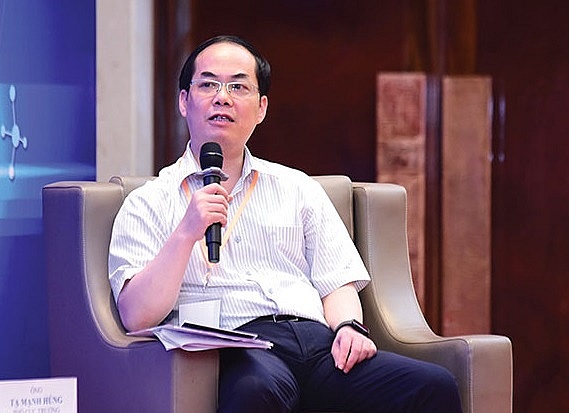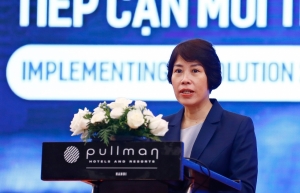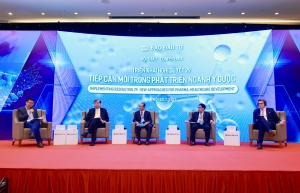More effort needed to increase pharma readiness
 |
| Ta Manh Hung - Deputy director Drug Administration of Vietnam Ministry of Health |
In the Law on Pharmacy 2016, there is a section on the pharmaceutical industry which states that attracting investment in the industry is a priority, especially in medicinal ingredients, specialised drugs, rare drugs, and others.
To realise the law, the government issued Decision No.376/QD-TTg approving a development programme for the pharmaceutical industry until 2030, in which we have clear goals about attracting investment in innovative and high-tech pharmaceuticals, striving to become a regional centre in the field and contributing about $1 billion to the country’s drug export value.
Resolution No.36-NQ/TW from January 2023 looks at the development and application of biotechnology, and the prime minister has decided to prioritise vaccines for humans. These policies are relatively ready, and we are continuing to complete the legal reform.
It is expected that the Law on Pharmacy will be revised in 2024, giving a priority to innovative drugs, rare drugs, vaccine technology, and biotechnology, and studying possible amendments of regulations related to distribution, and rearrangement of the distribution system to ensure efficiency. At present, the policies are relatively complete, but we will find where the bottlenecks are and solve them.
The pharmaceutical industry has made improvements from being only state-owned production units to now having many privatised companies. The number of factories has increased and developed rapidly in recent times.
However, the number of big companies capable of attracting foreign investors is limited, while local production focuses on generic medicines, and less on innovative ones.
Vietnam is also one of the few countries that can produce vaccines. Up to now, the country can produce 11 out of 12 in the national expanded vaccination programme. Nonetheless, the production is mainly based on traditional tech.
Recently, the World Trade Organization included Vietnam in the list of countries to receive mRNA vaccine technology transfer. This is also a step forward in pharmaceutical production.
However, the rate of funding in research and development is not high, and is failing at attracting high-quality manpower in the industry. These are the issues that we will continue to focus on in the upcoming time to attract investors in the industry.
 | Vietnam at the crossroads: The race to secure pharma investment The first panel session, themed Vietnam at the crossroads: The race to secure pharma investment, from VIR's event Realising Resolution 29: New Approaches for Pharma-Healthcare Development on July 20 drew significant attention. The discussion centred around the quality of labour in the pharmaceutical sector and the strategic decisions that Vietnam faces in its pursuit to attract investment in this vital industry. |
 | MPI calls on investors to make suggestions in pharma sector The Ministry of Planning and Investment has called on investors and manufacturers to contribute opinions and proposals to attract more investment capital and receive technology transfer to promote the development of the pharmaceutical sector of Vietnam. |
 | Powering innovation for sustainable pharma-healthcare development Experts highlighted the importance of powering innovation for sustainable pharma-healthcare development at the second panel discussion at a VIR conference on Thursday July 20. |
 | Vietnam's pharma sector shows potential Prof. Nguyen Hai Nam, rector of the Hanoi University of Pharmacy, recently asserted the potential strength of human resources in Vietnam's pharmaceutical sector, suggesting it could be the underpinning element for attracting global investment. |
What the stars mean:
★ Poor ★ ★ Promising ★★★ Good ★★★★ Very good ★★★★★ Exceptional
Themes: Healthcare Platform
- PM outlines new tasks for healthcare sector
- Opella and Long Chau join forces to enhance digestive and bone health
- Hanoi intensifies airport monitoring amid Nipah disease risks
- Cosmetics rules set for overhaul under draft decree
- Policy obstacles being addressed in drug licensing and renewal
Related Contents
Latest News
More News
- Citi economists project robust Vietnam economic growth in 2026 (February 14, 2026 | 18:00)
- Sustaining high growth must be balanced in stable manner (February 14, 2026 | 09:00)
- From 5G to 6G: how AI is shaping Vietnam’s path to digital leadership (February 13, 2026 | 10:59)
- Cooperation must align with Vietnam’s long-term ambitions (February 13, 2026 | 09:00)
- Need-to-know aspects ahead of AI law (February 13, 2026 | 08:00)
- Legalities to early operations for Vietnam’s IFC (February 11, 2026 | 12:17)
- Foreign-language trademarks gain traction in Vietnam (February 06, 2026 | 09:26)
- Offshore structuring and the Singapore holding route (February 02, 2026 | 10:39)
- Vietnam enters new development era: Russian scholar (January 25, 2026 | 10:08)
- 14th National Party Congress marks new era, expands Vietnam’s global role: Australian scholar (January 25, 2026 | 09:54)

 Tag:
Tag:


















 Mobile Version
Mobile Version